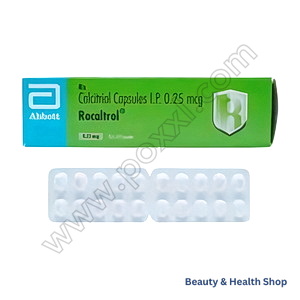ADDICTION
ALCOHOL DEPENDENCE
QUIT SMOKING
ALLERGY
ANTI FUNGAL
FUNGAL INFECTION
FUNGAL NAIL INFECTIONS
ANTI-REJECTION DRUGS
ANTI WORM
ANTIBIOTIC
BACTERIAL INFECTIONS
ARTHRITIS
GOUT
OSTEOARTHRITIS
RHEUMATOID ARTHRITIS
BLOOD
LOW PLATELET COUNT
THROMBOPHLEBITIS
VARICOSE VEINS
COLON
ANAL FISSURE
PILES
ULCERATIVE COLITIS
DIABETES CARE
DIABETES INSIPIDUS
DIABETES TYPE
DIABETIC FOOT ULCERS
GLUCOSE MONITOR
EYES/EAR CARE
DRY EYES
EYE CARE
EYE EXAMINATION
EYE INFECTION
EYE LASHES
EYE PAIN
GLAUCOMA
OCULAR HYPERTENSION
UVEITIS
FEVER CARE
MALARIA
RHEUMATIC FEVER
TYPHOID FEVER
GASTROINTESTINAL
ACIDITY
CONSTIPATION
CROHN'S DISEASE
DIARRHOEA
GALLBLADDER STONES
INTESTINAL ULCERS
IRRITABLE BOWEL SYNDROME
MOTION SICKNESS
NAUSEA
Potrate 5 mg (Potassium Citrate)
| Active Ingredient (Generic Name): | Potassium Citrate |
|---|---|
| Indication: | Nutritional deficiencies |
| Manufacturer: | Intas Pharmaceuticals Ltd |
| Packaging: | 10 tablets in one strip |
| Strength: | 5 mg |
From: $36.00
Potrate 5 mg, or Potassium Citrate, is prescribed to manage kidney stones by increasing urinary pH to prevent crystal formation. It’s also used for gout and renal tubular acidosis. Take it as directed by your healthcare provider, usually orally after meals with a full glass of water. Stay hydrated, follow dosing instructions, and watch for side effects like nausea or diarrhea. For severe symptoms like stomach pain or breathing difficulties, seek immediate medical help. To learn more about how Potrate 5 mg can effectively help manage these conditions, continue exploring its primary uses and benefits.
To start investigating the benefits of Potrate 5 mg (Potassium Citrate), let’s examine the primary uses and effects of this medication. Potrate 5 mg is commonly prescribed to manage certain types of kidney stones. It works by increasing the urinary pH, making the urine less acidic. This decrease in acidity helps prevent the formation of crystals in the urine, which can develop into kidney stones.
Additionally, Potrate 5 mg is utilized to treat conditions like gout and renal tubular acidosis. Gout is a type of arthritis caused by the buildup of uric acid crystals in the joints, and Potrate 5 mg can aid in reducing the formation of these crystals. Renal tubular acidosis is a condition where the kidneys are unable to effectively remove acid from the body, leading to an imbalance in the body’s pH levels. Potrate 5 mg helps regulate the acid-base balance in such cases, promoting kidney health and overall well-being.
Potrate 5 Mg Advantages
When considering the benefits of Potrate 5 mg (Potassium Citrate), you’ll find its advantages lie in effectively managing kidney stone formation and related conditions like gout and renal tubular acidosis.
Potassium citrate, the active ingredient in Potrate 5 mg, works by increasing urinary pH levels, which helps prevent the formation of certain types of kidney stones. By making the urine less acidic, Potrate 5 mg can reduce the risk of crystal formation in the kidneys, consequently aiding in the prevention of kidney stones.
Additionally, this medication may also be beneficial for individuals with gout, a form of arthritis caused by the buildup of uric acid crystals in the joints. By alkalinizing the urine, Potrate 5 mg can help dissolve uric acid crystals, potentially alleviating gout symptoms.
In addition, Potrate 5 mg is used in the treatment of renal tubular acidosis, a condition characterized by the inability of the kidneys to properly acidify the urine. By regulating urine pH levels, Potrate 5 mg can help manage this disorder effectively.
Why is this medication prescribed?
With its ability to effectively manage kidney stone formation, gout, and renal tubular acidosis, Potrate 5 mg (Potassium Citrate) is prescribed for specific conditions related to urinary pH levels.
This medication is commonly used to prevent the formation of certain types of kidney stones by making the urine less acidic. By raising the urinary pH, Potrate 5 mg helps dissolve existing stones and prevents the formation of new ones.
Additionally, it can be prescribed for individuals with gout to help alkalinize the urine, aiding in the elimination of uric acid crystals. In cases of renal tubular acidosis, where the kidneys are unable to effectively acidify the urine, Potrate 5 mg can help correct the acidic imbalance.
How should this medicine be used?
When using Potrate 5 mg (Potassium Citrate), follow the specific dosing instructions provided by your healthcare provider to ensure maximum effectiveness. Typically, this medication is taken by mouth, usually 2 to 4 times a day after meals or as directed by your doctor. It’s essential to swallow the tablets whole with a full glass of water to help prevent stomach upset. Don’t crush, chew, or suck on the tablets.
To get the most benefit from Potrate 5 mg, take it regularly at the same times each day. If you miss a dose, take it as soon as you remember. However, if it’s almost time for your next dose, skip the missed dose and continue with your regular dosing schedule. Don’t double up on doses to make up for a missed one.
It’s important to stay well-hydrated while using this medication unless otherwise directed by your healthcare provider. Contact your doctor immediately if you experience any unusual side effects or if your condition worsens while taking Potrate 5 mg.
Other uses for this medicine
To explore other uses for Potrate 5 mg (Potassium Citrate), consider its potential applications beyond its primary indication.
While Potrate 5 mg is primarily prescribed to manage kidney stones by increasing urinary citrate excretion, it may also have secondary uses. Some healthcare providers may recommend Potrate 5 mg to help prevent the formation of certain types of kidney stones, such as calcium oxalate stones, in individuals prone to recurrent stone formation.
Additionally, Potrate 5 mg has been studied for its potential to alleviate symptoms associated with conditions like gout, where high levels of uric acid in the body lead to painful joint inflammation. In some cases, Potrate 5 mg may be prescribed off-label for these conditions by healthcare professionals familiar with its properties.
It’s important to consult a healthcare provider before using Potrate 5 mg for any off-label purposes, as individual circumstances and medical histories can impact its effectiveness and safety in alternative applications.
What special precautions should I follow?
Before taking Potrate 5 Mg, it’s crucial to check your potassium levels regularly to avoid any complications.
Make sure you follow your healthcare provider’s instructions closely to prevent any potential side effects.
If you have any concerns or experience unusual symptoms, consult your doctor immediately.
Check Your Potassium Levels
Make sure to regularly monitor your potassium levels for any fluctuations while taking Potrate 5 mg (Potassium Citrate).
-
Check with your healthcare provider: Ensure regular potassium level tests.
-
Maintain a potassium-rich diet: Consume foods like bananas, oranges, and spinach.
-
Stay hydrated: Drink an adequate amount of water daily.
-
Avoid excessive potassium intake: Follow the prescribed dosage strictly.
-
Report any symptoms: Inform your doctor of unusual fatigue or muscle weakness.
What special dietary instructions should I follow?
Following a balanced diet that includes foods rich in potassium while taking Potrate 5 mg (Potassium Citrate) can help support your treatment regimen. Potassium-rich foods play an important role in maintaining ideal levels of this essential mineral in your body. Incorporating items such as bananas, sweet potatoes, spinach, and avocados into your meals can aid in replenishing potassium levels effectively.
It’s recommended to limit high-potassium foods if your healthcare provider advises, as excessive potassium intake may interfere with the medication’s effectiveness. Additionally, ensuring adequate hydration by drinking plenty of water throughout the day is beneficial when taking Potrate 5 mg. Alcohol consumption should be moderated, as it can lead to dehydration and potentially impact the medication’s efficacy.
Maintaining a well-rounded diet that includes a variety of nutrient-dense foods alongside Potrate 5 mg can contribute to the overall success of your treatment plan. Always consult your healthcare provider or a nutritionist for personalized dietary recommendations tailored to your specific needs.
What should I do if I forget a dose?
If you forget a dose of Potrate 5 mg (Potassium Citrate), take it as soon as you remember, unless it’s almost time for your next scheduled dose. In such a case, skip the missed dose and continue with your regular dosing schedule. Don’t double the dose to catch up.
It’s important to maintain a consistent intake of Potrate 5 mg to achieve the desired effects. If you find that you frequently forget doses, consider setting a reminder on your phone or associating it with a daily routine to help you remember. Missing doses can affect the medication’s effectiveness, so try to be diligent with your dosing schedule.
If you have any concerns or questions about missed doses or how to manage your medication regimen, consult your healthcare provider for guidance. Remember, consistency is key in maximizing the benefits of Potrate 5 mg.
What side effects can this medication cause?
Some side effects of Potrate 5 mg (Potassium Citrate) can be serious, so it’s important to monitor for any persistent symptoms.
If you notice any concerning symptoms like severe stomach pain, confusion, weakness, irregular heartbeat, or swelling, contact your doctor immediately for further guidance.
Being mindful of these potential side effects and seeking prompt medical attention can help guarantee your well-being while taking this medication.
Monitor for Persistent Symptoms
Experiencing persistent symptoms while taking Potrate 5 mg (Potassium Citrate) can indicate potential side effects that require monitoring. Some side effects you may encounter include:
- Nausea or vomiting
- Stomach pain or discomfort
- Diarrhea
- Headache
- Dizziness
If you notice any of these symptoms persisting or becoming bothersome, it’s crucial to inform your healthcare provider promptly. Monitoring these side effects closely can help oversee your treatment effectively and guarantee your well-being.
Remember to report any unexpected or severe symptoms to your doctor for further evaluation and guidance. Your healthcare provider can offer insights on how to alleviate these side effects and adjust your treatment plan accordingly.
Some side effects can be serious. If you experience any of the following symptoms, call your doctor immediately:
To ensure your well-being while taking Potrate 5 mg (Potassium Citrate), it’s important to be mindful of potential serious side effects that may require immediate medical attention. Some side effects can be severe, and if you experience any of the following symptoms, it’s essential to call your doctor promptly:
- Severe stomach pain
- Difficulty breathing
- Irregular heartbeat
- Muscle weakness
- Numbness or tingling in the hands, feet, or lips
These symptoms could indicate a serious reaction to the medication and shouldn’t be ignored. Contact your healthcare provider immediately if you notice any of these signs while using Potrate 5 mg. Your safety is paramount, and timely medical intervention is crucial in such situations.
What should I know about the storage and disposal of this medication?
When storing Potrate 5 mg (Potassium Citrate), make sure it’s kept in a cool, dry place away from moisture and heat. This medication should be stored at room temperature between 68-77 degrees Fahrenheit. Avoid storing it in the bathroom or kitchen where humidity levels can be higher. Keep the medication out of reach of children and pets to prevent any accidental ingestion. Check the expiration date before use and dispose of any expired medication.
In terms of disposal, don’t flush Potrate 5 mg tablets down the toilet or pour them into a drain unless instructed to do so. Proper disposal helps prevent environmental contamination. The best way to dispose of this medication is through a medicine take-back program. You can inquire with your pharmacist or local waste disposal company about the options available in your area. If a take-back program isn’t accessible, mix the tablets with an unpalatable substance like dirt or cat litter in a sealed plastic bag before throwing it in the household trash. Remember to remove any personal information from the medication packaging before disposal.
In case of an emergency/overdose
In case of an emergency or overdose with Potrate 5 mg (Potassium Citrate), immediately contact your local poison control center or seek medical assistance. If you or someone else has taken too much Potrate 5 mg, it’s important to act promptly. Symptoms of an overdose may include confusion, weakness, irregular heartbeat, or tingling in the hands or feet. Don’t wait for symptoms to worsen before seeking help.
When you contact the poison control center or go to the emergency room, be prepared to provide information such as the amount of Potrate 5 mg ingested, the time of ingestion, and any symptoms experienced. Medical professionals will assess the situation and provide appropriate treatment, which may include measures to help eliminate excess Potrate 5 mg from the body and manage any symptoms present.
What other information should I know?
If an individual is prescribed Potrate 5 mg (Potassium Citrate), understanding additional information is crucial to using the medication effectively and safely. It’s vital to take Potrate 5 mg exactly as directed by your healthcare provider. Don’t modify the dosage unless instructed to do so by a healthcare professional. This medication should be taken with food or just after eating to decrease the risk of stomach upset. Remember to drink plenty of fluids while taking Potrate 5 mg to help prevent kidney stones.
Notify your healthcare provider about any other medications, supplements, or medical conditions you have before starting Potrate 5 mg to avoid potential interactions or complications. It’s recommended to avoid foods high in potassium or salt substitutes while on this medication unless otherwise instructed by your doctor. Regular monitoring of your kidney function, potassium levels, and urine pH may be necessary during treatment to guarantee the medication is working effectively and safely. If you have any concerns or questions about Potrate 5 mg, don’t hesitate to consult your healthcare provider for clarification and guidance.
Brand names
To identify Potrate 5 mg (Potassium Citrate) under different commercial names, inquire with your pharmacist for the brand names available in your region. Some brand names of Potrate 5 mg (Potassium Citrate) may vary depending on the country or pharmaceutical company. Here is a table showing a few common brand names of Potrate 5 mg (Potassium Citrate) used globally:
| Brand Name | Manufacturer |
|---|---|
| Urocit-K | Mission Pharmacal |
| Polycitra-K | Abbott |
| Cidnax | Sun Pharmaceutical Industries |
These are just a few examples, and there may be other brand names for Potrate 5 mg (Potassium Citrate) available in your area. Your pharmacist can provide you with more specific information based on the products they carry. Understanding the various brand names is crucial to ensure you are receiving the correct medication prescribed by your healthcare provider.
Purchase From Licensed Pharmacies
When acquiring Potrate 5 mg (Potassium Citrate), always make sure you purchase from authorized pharmacies to guarantee the authenticity and quality of the medication. Authorized pharmacies are regulated and monitored to make certain they meet specific standards for storing and dispensing medications. By buying from an authorized pharmacy, you can have confidence that the Potrate 5 mg you receive is genuine and safe for consumption.
Authorized pharmacies obtain their medications from reputable sources, reducing the risk of counterfeit or substandard products. They also have trained pharmacists who can provide guidance on the proper usage and potential side effects of Potrate 5 mg. Additionally, authorized pharmacies keep detailed records of their transactions, which can be vital for tracking your medication history and ensuring you receive the correct dosage each time.
Furthermore, purchasing from an authorized pharmacy may offer you additional benefits such as insurance coverage or discounts. It’s vital to prioritize acquiring Potrate 5 mg from authorized pharmacies to safeguard your health and well-being.
To summarise
Secure your peace of mind by consistently purchasing Potrate 5 mg (Potassium Citrate) from licensed pharmacies that guarantee authenticity and quality. Potrate 5 mg is a medication commonly used to manage kidney stones by regulating urinary pH levels. It contains potassium citrate, which helps prevent the formation of certain types of kidney stones. When taking Potrate 5 mg, it’s essential to follow your healthcare provider’s instructions regarding dosage and frequency to achieve best results.








There are no reviews yet.